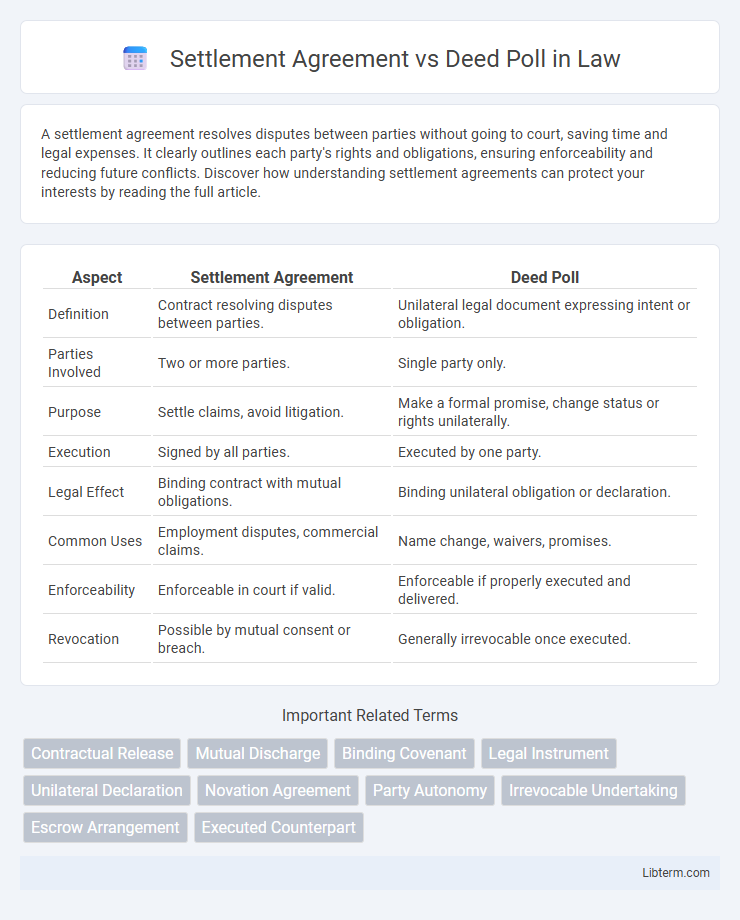A settlement agreement resolves disputes between parties without going to court, saving time and legal expenses. It clearly outlines each party's rights and obligations, ensuring enforceability and reducing future conflicts. Discover how understanding settlement agreements can protect your interests by reading the full article.
Table of Comparison
| Aspect | Settlement Agreement | Deed Poll |
|---|---|---|
| Definition | Contract resolving disputes between parties. | Unilateral legal document expressing intent or obligation. |
| Parties Involved | Two or more parties. | Single party only. |
| Purpose | Settle claims, avoid litigation. | Make a formal promise, change status or rights unilaterally. |
| Execution | Signed by all parties. | Executed by one party. |
| Legal Effect | Binding contract with mutual obligations. | Binding unilateral obligation or declaration. |
| Common Uses | Employment disputes, commercial claims. | Name change, waivers, promises. |
| Enforceability | Enforceable in court if valid. | Enforceable if properly executed and delivered. |
| Revocation | Possible by mutual consent or breach. | Generally irrevocable once executed. |
Understanding Settlement Agreements
Settlement agreements legally resolve disputes between parties by outlining mutually agreed terms to avoid litigation, often used in employment or commercial contexts. These contracts are binding and enforceable in court, requiring clear, comprehensive clauses addressing obligations, confidentiality, and dispute resolution. Understanding settlement agreements involves recognizing their role in providing finality, protecting rights, and ensuring compliance with agreed-upon terms.
What Is a Deed Poll?
A deed poll is a legal document executed by an individual to formally declare an intention or change, most commonly used for changing one's name. Unlike a settlement agreement, which involves two or more parties resolving disputes and is legally binding upon mutual consent, a deed poll is a unilateral declaration made by a single party. It must be signed, witnessed, and delivered to be effective, serving as clear evidence of the commitment or change made by the individual.
Key Differences Between Settlement Agreements and Deed Polls
Settlement agreements legally bind parties to resolve disputes and often include mutual obligations, while deeds polls are unilateral declarations expressing a single party's intent or change, such as a name change. Settlement agreements require contract consideration and usually involve negotiation, whereas a deed poll is executed by one individual without the need for consent or contract consideration from others. The enforceability of settlement agreements hinges on mutual agreement and precise terms, while deeds poll rely on formal execution and registration for legal recognition.
Legal Uses and Purposes
Settlement Agreements legally resolve disputes between parties, commonly used in employment, commercial, or personal injury cases to avoid litigation by outlining mutually agreed terms and conditions. Deed Polls serve as unilateral declarations, frequently utilized for legal name changes or renunciations, and are enforceable without needing acceptance by another party. Both instruments bind parties legally but differ in nature: Settlement Agreements require multiple parties' consent, whereas Deed Polls are executed by a single individual to effect specific legal changes.
Binding Nature and Enforceability
A Settlement Agreement is a legally binding contract between parties, enforceable in court, designed to resolve disputes without litigation. A Deed Poll is a unilateral legal document, also binding and enforceable, typically used to express a single party's intention or change, such as a name change. Both instruments carry legal weight, but Settlement Agreements involve mutual obligations, whereas Deed Polls impose commitments solely on the executing party.
Typical Scenarios for Settlement Agreements
Settlement agreements commonly arise in employment disputes where an employee agrees to waive claims in exchange for compensation, resolving issues like unfair dismissal or discrimination. They are often used in commercial disputes to avoid costly litigation by mutually agreeing on terms for breach of contract or partnership dissolution. Unlike a deed poll, which is a unilateral declaration, settlement agreements require mutual consent and typically involve negotiation between two or more parties.
When to Use a Deed Poll
A Deed Poll is used primarily when an individual needs to unilaterally change a legal matter such as their name without requiring the consent of another party. It is appropriate for personal actions like changing a name on official documents or discharging a debt independently. Unlike a Settlement Agreement, which resolves disputes between two or more parties, a Deed Poll serves as a legally binding declaration made by one person only.
Legal Requirements and Documentation
A Settlement Agreement requires mutual consent between parties and must be documented in writing to be legally enforceable, typically involving detailed clauses outlining obligations and dispute resolution mechanisms. A Deed Poll, by contrast, is a unilateral legal document executed by a single party, often used for name changes, and must be signed, witnessed, and delivered to have legal effect. Both documents demand strict adherence to formalities, including signatures and, in some jurisdictions, notarization or registration to validate their legal standing.
Costs and Timeframes Involved
Settlement agreements typically involve higher costs due to legal fees associated with negotiation and drafting by solicitors, whereas deeds poll are generally simpler and less expensive, often completed without legal assistance. The timeframe for finalizing a settlement agreement can extend from several weeks to months depending on the complexity of the dispute and negotiations; in contrast, deeds poll can usually be executed within a matter of days. Costs for settlement agreements may range from hundreds to thousands of dollars, reflecting the customized terms, while deeds poll costs often remain minimal, primarily administrative or notarization fees.
Choosing the Right Legal Instrument
Choosing the right legal instrument between a Settlement Agreement and a Deed Poll depends on the specific circumstances and intended outcomes. A Settlement Agreement is typically used to resolve disputes between two or more parties with mutual obligations and enforceable terms, often incorporating confidentiality clauses and compensation details. In contrast, a Deed Poll is a unilateral document used to effectuate a singular action like a name change, requiring no agreement from other parties and offering a simpler, legally binding declaration.
Settlement Agreement Infographic

 libterm.com
libterm.com